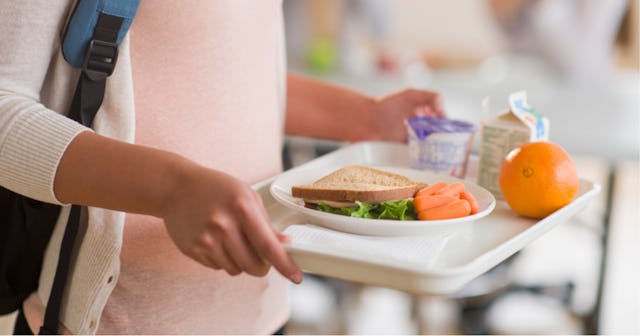School Cafeteria Workers—We Owe You Big Time

I was a kid who relied on reduced cost or free school lunches. With that came embarrassment and shame because I knew we were poor. While there were some lunches I really loved—hello, mashed potatoes and gravy or that weird cafeteria version of pizza—standing in line every day indicated a lack of choice as my friends made their way to a table with their homemade lunches and extra time to socialize with friends.
Because I needed to displace some of my resentment, I held ill will for the cafeteria workers serving my food. It was a childish thing to do, but because I felt judged, I judged them for the job they were doing. Who the hell would want that job? Clearly these people weren’t smart enough for real jobs with integrity. Cafeteria workers got bad raps from books, urban legends of the evil lunch lady, and Adam Sandler songs. Somewhere along the way, lunch ladies became stigmatized as villains. I was so wrong and misguided. The reality is that school cafeteria workers are vital, and my ungrateful ass should have been thanking them for their hard work. It’s a little late, but I want to say thank you now, and you should too.
School cafeteria workers have always been essential, but their work to feed kids throughout this pandemic has shown us that they are superheroes. When schools shut down last March, with many of them still closed, teachers and administrators were able to work from home and provide online learning. Students weren’t getting the education they were used to, but there was at least an option for school to continue. Schools did their best to make technology available to all students but inequities still existed. But access to high speed, or any, internet wasn’t the only problem: Students and families rely on schools for food too.
More than 11 million children live in food-insecure homes in America, and 22 million students rely on free or reduced-cost meals while they are in school. The pandemic put food-insecure families at higher risk for loss of jobs, wages, and for contracting COVID-19. People who are already struggling to put food on the table struggled even more to do so because they have jobs that aren’t flexible or possible to do at home. These families are also less likely to have health insurance, so while they need to work to pay the bills, they don’t have the medical protection they need during a pandemic. Unlike learning, kids can’t virtually eat, so schools and cafeteria workers hustled to put plans into place to be sure anyone who needed food could still be fed.
Cafeteria workers across the nation got it done. They showed up in cities, rural towns, and suburbs in between to be sure families could count on food when so much of everyday life was uncertain. Daily breakfast and lunch grab-and-go bags were available at pick-up stations or were delivered to students all across the United States.
I saw the work that went into bagging thousands of meals each day. Our district set up tents and outdoor coolers to pass meals off to me and others who drove up to pick up food for the day. The same group of workers showed up each day, often dancing to music, and quickly learned how many bags of food families needed before the driver would signal the number with their fingers. They emphatically waved and told parents and kids how much they missed everyone. Handing out the meals wasn’t the only task; these hard workers had spent hours beforehand prepping and bagging the food. And then they would need to redistribute food for the next day. From the cold March weather to the scorching August heat, our food service providers were badass symbols of hope.
Behind that hope, though, was the heat of a kitchen (on top of summer heat) and the need to wear personal protective gear while expected to maintain six feet of distance in understaffed conditions for a median wage of roughly $10 an hour. Forget dancing while working; those conditions would be enough to make most people refuse to come into work at all. But school food service workers still showed up, even though they were putting themselves and their own families at risk of COVID-19. Yes, they needed the money for their own families, but they are very aware of how many kids would go hungry if they didn’t show up for other families too.
Despite working hard to feed our kids, cafeteria workers haven’t been immune to layoffs. Instead of being given raises and medals, some workers have been given pink slips. Recently 50 of the 70 district cafeteria workers in Pittsfield, Massachusetts were laid off. In regard to the news after months of sacrifice, Stephanie Koenig a co-chairwoman of the Pittsfield Federation of School Employees cafeteria unit said, “We had to fight for them to provide us [personal protective equipment]. We were scared; we didn’t know what we were dealing with at all. We put our families at risk; I put my daughter’s health at risk.” These essential cafeteria workers made sure one of the most vulnerable populations were cared for in their community, but they are now in vulnerable positions themselves as they lose income and the health insurance.
This pandemic has been hard on so many people, but if districts know what’s good for their communities, they won’t bite the hands that feed them — literally. Our school cafeteria workers are fucking heroes, and deserve our sincerest thanks.
This article was originally published on